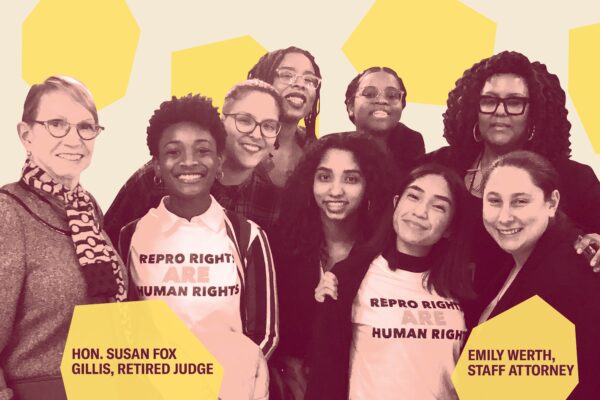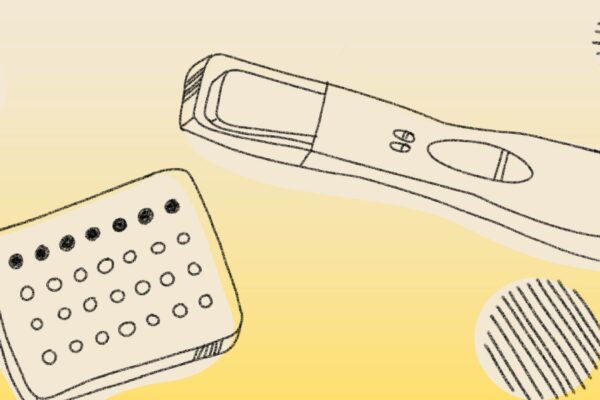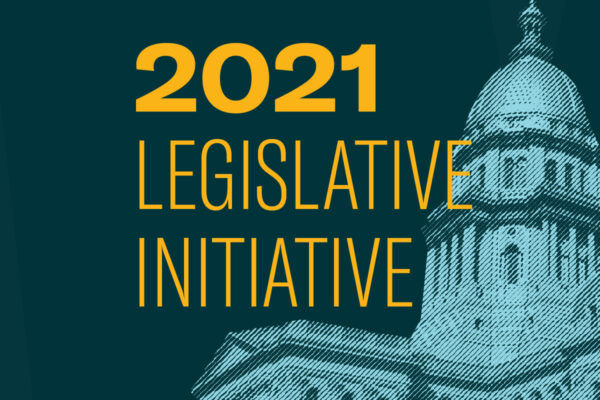During the 2021 Veto Session, advocates including Emily Werth and Hon. Susan Fox Gillis testified before the House Executive Committee on October 27, in support of HB 370, a measure to repeal the Parental Notice of Abortion Act.
Testimony of Emily Werth, Staff Attorney at the ACLU of IL
Thank you to the Chair and the members of the Committee for the opportunity to testify today.
My name is Emily Werth. I am a staff attorney at the ACLU of Illinois, working directly with the Judicial Bypass Coordination Project. Since the Parental Notice of Abortion Act first went into effect, this project has worked to ensure that young people who fear being harmed by involving their parents or other designated adult family members in their abortion decision have assistance with the burdensome legal process of judicial bypass. I have personally represented about 85 minors in judicial bypass hearings, and coordinated hundreds of referrals to volunteer attorneys.
Forced parental involvement laws hurt young people and serve no valid purpose. This conclusion comes from decades of social science research and the experience of the clients I have represented. That is why I urge this Committee to support the Youth Health and Safety Act, to repeal the Parental Notice of Abortion Act and instead identify more resources for pregnant and parenting youth.
Our project has represented more than 575 young people across the state forced to pursue a judicial bypass under the law, and in over 99.8% of cases the request for a waiver has been approved. Some argue this is a sign that the system is working, but that is a grave error. The system is complicated, and creates significant logistical and emotional burdens for young people. This number only reflects the young people who actually managed to get to court.
There have been many who simply could not find a way to miss school to attend court during business hours without their parents being alerted. Other young people had families that were going through crises which prevented them from being able to get away for long enough to meet with a judge without raising suspicion. In other instances, a young person making arrangements for the court process was discovered by a parent, putting them in a dangerous situation. And then there were clients who were delayed for so long by the barriers to accessing the judicial bypass process that they were no longer within the legal window to obtain an abortion in Illinois. Human Rights Watch recently found this process has taken up to 47 days for some young people to complete. What haunts me are those youth who may have ended up parenting before they were ready because of this law.
No matter their individual circumstances, the judicial bypass process is always daunting for young people, and creates nothing more than fear and anxiety. It is no wonder. A complete stranger essentially holds the young person’s fate in their hands, and has control over the young person’s ability to make this consequential decision about their future and body. And the fear and anxiety of this process is compounded for youth of color who know how systemic discrimination in the legal system has impacted their communities, and who make up the majority of the young people who go through the bypass process. In my experience, the most emotionally challenging part of the bypass hearing for many young people – and the one most likely to make them tearful – is when they must describe for the judge the difficult or traumatic family circumstances that forced them to come to court for a judicial bypass in the first place. And once the bypass hearing is finally concluded and a young person knows that the judicial bypass will be granted, the change in their demeanor, and their relief, is palpable every time.
This is the reality of the judicial bypass system. It is not simply filling out a form at the courthouse.
This law forces youth into a fundamentally unjust choice between involving unsupportive or unavailable family members in their abortion decision, or trying to navigate an unfamiliar and intimidating court system. The bypass process is just a futile exercise – a barrier imposed for its own sake, which does nothing to help the young people who must endure it, and prevents some from ever obtaining the abortion care they are seeking.
The evidence and experience of the past eight years is clear: Parental Notice of Abortion threatens the health, safety and dignity of too many young people in Illinois. That is why I urge you to support the Youth Health and Safety Act and repeal this dangerous law.
Thank you for your consideration, and I look forward to answering any questions you may have for me.
Testimony of Honorable Susan Fox Gillis, Retired Judge
Committee Chair and members,
My name is Susan Fox Gillis. I retired three years ago as an Associate Judge in the County Division of the Circuit Court of Cook County. Over nearly two decades, I heard issues including adoptions, name changes and – over my last several years as a judge – judicial bypass hearings for young women seeking to have an abortion without notifying their parent, grandparent, step parent or legal guardian under the Parental Notice of Abortion Act of 1995.
Hundreds of young women have come to the Circuit Court of Cook County since this law went into effect asking a judge like me to grant a waiver of parental notice. As judges in these matters, my colleagues and I tried to make the process as non-intimidating as we could – keeping the identity of the young woman anonymous, hearing these cases in our chambers instead of a court room, not wearing our robes to lessen their anxiety, and being as accommodating as possible to scheduling issues outside of the young person’s control.
But, make no mistake. No matter what a judge does, these hearings remain intimidating for young women as they come before us, a judge and a stranger, to answer intimate questions about their lives in order to be allowed to have this medical procedure that they have determined is best for them and their personal circumstances.
I am here today to urge this Committee to support this bill which would repeal the Parental Notice of Abortion Act. That law – in my experience as a judge tasked with deciding on these waivers – is unnecessary, overly punitive and places burdens on young women seeking health care.
It should be repealed.
Each of the young women who came before me had a good reason for not sharing her decision with a parent. The specifics of the reasons varied – a history of abuse and harm that would be repeated, an older sibling who had been forced to continue a pregnancy against her will, fear of being kicked out of her home based on past threats from her parent, an extraordinary circumstance like illness or issues of mental health in a family, or the absence of the parents from the young woman’s life. The young women who appeared in front of me saw sharing their story with me as their only option.
The young women I heard from showed a level of maturity and the competence to make this important decision. They truly were thinking about their lives and their future – and all the considerations about that future – in deciding that they were not yet prepared to become a parent. Every young woman who came in front of me met the level of maturity and was fully informed in order to meet the requirements of the law, and was thoughtful and thorough in considering all her options and reaching her decision. This law did not help them, it simply created an unnecessary hurdle for them. Some decisions I made over the years as a judge could be difficult; the decisions to grant a bypass to these young women were not.
As a Judge, I thought I understood the hurdles that young people overcame to get to my courtroom for the judicial bypass process, based on the stories I heard in court. But I never really understood what these young women go through, and the implications of this law, until I represented a client in the bypass process myself.
After I retired from the bench I volunteered to represent one of these young women in her bypass hearing. Speaking and preparing for court with her was difficult. Calls were a challenge to arrange and often cut off – even in mid-sentence or mid-discussion – as she tried to find a time when her parent was not around, a time when she would not be overheard and we could talk safely. She also struggled to figure out a way to get herself to the courthouse for her hearing; after her initial transportation plan fell through, she considered using her mother’s Uber account, until she realized that her mother would be able to see that she had taken a car to downtown Chicago if she did that.
This experience shed new light for me on the fact that young people have to go to extraordinary and unfair lengths just to get to court to obtain a judicial bypass. In addition, particularly in smaller counties or jurisdictions, the chance of the young woman being recognized in the courthouse is significant and presents a real challenge.
For these reasons, I am pleased to be here to support this bill which would repeal the Parental Notice of Abortion Act in Illinois. And I look forward to answering your questions.





